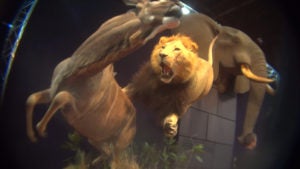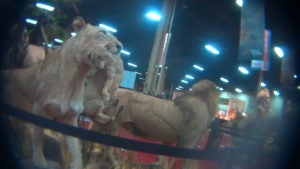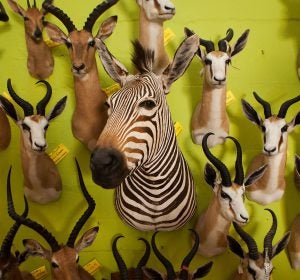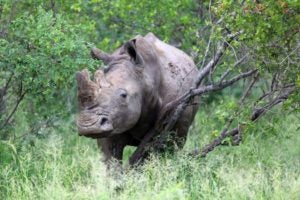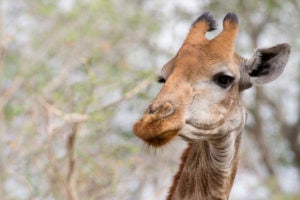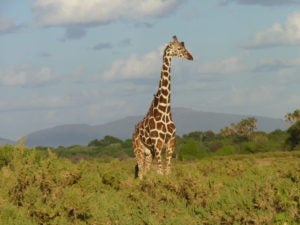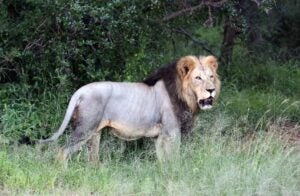
BRUSSELS—Humane Society International/Europe, Pro Wildlife, Born Free Foundation, Eurogroup for Animals and Pan African Sanctuary Alliance today presented a new report at an event at the European Parliament, which was hosted by German MEP Manuela Ripa ÖDP, Greens/EFA. The report highlights how the recreational killing of threatened and protected animals for trophies undermines the EU’s efforts to meet its ambitions to better protect wildlife and halt biodiversity loss. The NGOs are calling on the EU to take action to ban the import of hunting trophies from threatened and protected species. Just last week the European Parliament passed a resolution also calling for an EU wide import ban of hunting trophies from species protected under the CITES (Convention on International Trade in Endangered Species) treaty.
Dr. Joanna Swabe, senior director of public affairs for Humane Society International/Europe, says: “In its Biodiversity Strategy to 2030, the European Commission loudly trumpets its goal of halting global biodiversity loss, yet the EU continues to be the second largest importer of hunting trophies in the world. It is only a tiny minority of wealthy European citizens who choose to travel to other countries to kill endangered and threatened species for their own twisted pleasure. Their trophy hunting poses a completely unnecessary and additional threat to biodiversity. Many wildlife populations across the globe are already under pressure from habitat loss and degradation, climate change, over-exploitation and poaching, they really don’t need a bunch of ego ists stalking them with high-powered rifles or bows just so they can hang their body parts on the walls of their homes as proof of their hunting prowess. The EU must take action to halt these vile imports.”
Dr. Mark Jones, head of policy for the Born Free Foundation, adds: “It is high time that the EU reconsiders its policy towards consumptive wildlife use, of which trophy hunting is an egregious example. Each year, hundreds of thousands of wild animals suffer and die at the hands of wealthy hunters for ‘trophies’ to skin, stuff, and hang on a wall. Not only does wildlife have an intrinsic value, but wild animals, such as giraffes, elephants, polar bears and rhinos, are ultimately worth more alive than dead. Many of these trophies are imported into EU countries. We believe that the EU should be looking at how it can encourage and reward investment in protecting wildlife, and explore the benefits that can be gained by local communities through its non-consumptive and ecologically sustainable use.”
Dr. Mona Schweizer of Pro Wildlife adds: “The trophy hunting industry is always quick to claim that their activities help poor indigenous communities in Africa and elsewhere. Yet, there is ample evidence that little money trickles down to individual local community members or households. There are limited job opportunities for locals working for trophy hunting outfitters, which are usually operated by white, foreign business owners. In major exporting countries such as South Africa and Namibia trophy hunting largely takes place on private farms. Any benefits there may be from trophy hunting are not distributed equally. Few people in communities where trophy hunting programmes are operated profit from them. Indeed, trophy hunting even perpetuates wealth inequalities. The European Commission should stop taking industry claims about supporting livelihoods at face value and consider who really benefits from this bloodsport? It’s neither local communities nor wildlife! ”
Reineke Hameleers, CEO of Eurogroup for Animals, says: “There is strong public support for banning hunting trophies imports. It is no wonder that there has already been movement in a number of Member States with regard to halting the import of hunting trophies from threatened and endangered species. Earlier this year, the Belgian Federal Parliament unanimously passed a resolution demanding that the government immediately stop authorising trophy import permits of species protected under certain international trade regulations. If the responsible Minister takes action, she will be following in the footsteps of the Netherlands, which used the same legal path to ban hunting trophy imports from over 200 species back in 2016. Last week, the European Parliament adopted a Resolution that includes a call for the Commission and Member States to take ‘immediate effective action in the framework of its commitments outlined in the EU biodiversity strategy to ban the import of hunting trophies derived from CITES-listed species’. The long-awaited revision of the EU Action Plan against Wildlife Trafficking should provide an ideal opportunity for them to do so.”
Background:
- Second to the USA, the EU is the next largest importer of animal trophies in the world; since 2016, the EU is the largest importer of lion trophies globally.
- Trophies from at least 15,000 internationally protected mammals from 73 CITES-listed species have been legally imported to the EU during the period 2014-2018 and there has been an increase of nearly 40% of trophy imports during this period. If you add other taxa and species that aren’t afforded international protection, the true number is far higher.
- The top five EU Member States to import mammalian hunting trophies were Germany, Spain, Denmark, Austria and Sweden.
- At present, the EU legal requirement for hunting trophies to be accompanied by import permits relates only to species in Annex A of the EU Wildlife Trade Regulation and six additional species listed in Annex B, namely the African elephant, common hippopotamus, African lion, southern white rhinoceros, polar bear and Argali sheep.
- Legally obtained hunting trophies of the species covered by these rules can only be imported into the EU after a Member State has issued an import permit and verified that such imports have been legally acquired and will not be detrimental to the conservation of the species . There is no transparent process for the issuance of such permits and non-detriment findings. Hunting trophies of all other species are exempted from this rule.
- The International Union for the Conservation of Nature’s World Commission on Environmental Law Ethics Specialist Group calls for an end to hunting trophy imports under ethical, ecological and legal reasons.
- The Belgian Federal Parliament unanimously passed a resolution demanding that the government immediately stop authorising trophy import permits of species protected under certain international trade regulations.
- This year, the governments of Italy, Spain and Poland are actively considering policy options to ban the import and export of certain hunting trophies supported by strong public opinion polls; based on a 2021 representative survey, the majority of citizens in each country support a hunting trophy import ban.
- Prior to these developments, the Netherlands and France pioneered this paradigm shift in Europe. In 2015, France implemented a ban on the import of lion hunting trophies. In the same year, the Dutch government adopted a decision to ban the trophy imports of over 200 species, which came into force in 2016.
- A recent policy statement signed by around 170 conservation and animal protection non-governmental organisations from around the globe is also calling for an urgent end to trophy hunting. Several of these organisations are from key source countries for hunting trophies.
ENDS
Media contact: Adeline Fischer: +4917631063219; afischer@hsi.org

